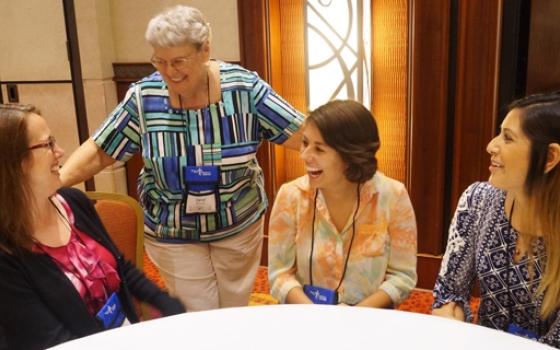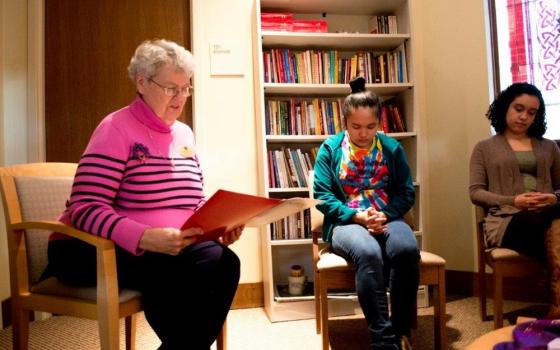Having just completed my 59th year of ministry in religious life, I am in awe of the knowledge gained along the way. I've spent these years largely in service to youth and young adults, so it is from them that I have learned about their lives and also mine; about God's working in subtle and not-so-subtle ways.
Most recently my work has been as a full-time volunteer in campus ministry at Saint Xavier University in Chicago. This has brought me face-to-face with a variety of situations, needs, struggles, decisions and burdens — but also blessings — that today's young people negotiate, endure, accept and manage. I have found that when they acknowledge the need for God and rely on faith, they can more easily see the difference that such reliance makes. It helps them manage life's challenges. They also learn that complications come when they deny, reject or avoid any relationship with their Creator. And so also it is with me and all of us more mature persons traversing life's journey.
Their realities coincide with mine and, undoubtedly, yours. We are all on a God-quest, seeking someone who will and can listen to our life story in a safe and secure place. The difference might be that some of us are conscious of a need for God and others not so. Some of the students are open about the fact that they are "spiritual but not religious" and this declaration creates an opportunity for conversation about the meaning of each of these aspects of their lives. I have found that often these words are often spoken with conviction but that the students are unaware of their implications. Still they listen and learn. Some also act on what they learn.
Many young adults I have encountered are open about their failures and about their deep desire to return to God after a few years of leave-taking from the practice of their faith. They speak openly of their sexuality and the struggles and shame that they have been holding for some time. In many cases feelings of "I am not good enough" holds them back from becoming what God desires for them. So I have found that listening and encouraging are stances any adult can offer them. Parents, teachers and women religious are especially in positions to engage in these conversations with young adults. One merely needs to step back in time and get in touch with one's own failures and experiences to recall what those feelings were and continue to be for today's youth.
I have learned that the young are as flawed as we are but there is always hope for each of us as prodigal children of God. Unlike what others might say, it's been my experience that today's younger generations are filled with zest and zeal for service. They are eager to use their time and energy on behalf of those less able, more needy, whether intellectually, emotionally, physically or even spiritually. Our students do not spend their spring breaks as many others do, traveling to islands in the Caribbean for pleasure. They willingly, and with great enthusiasm, spend time going to places to serve others: cleaning, building, organizing and, most of all, meeting people who have few privileges and possessions yet still exude the joy of life. Their travel often takes the students to places beyond their comfortableness and into worlds unknown by them. On their return they have ample time to reflect on being grateful, and not guilty, for what they have and others do not. I have seen this first-hand in traveling with them and witnessing the joy when they return. On campus, I see how upon return they simplify their lives and make more choices on behalf of others in need, both on campus and beyond.
In working and praying with the students, I have learned of the grieving they have experienced in their relatively short lives. Loss of parents, siblings, fellow students, broken relationships in families and with first-loves and more cause deep pain for many of them. My heart aches to listen to these stories of separation. I discover a bond in our common humanity that brings all of us closer together in a faith community that also invites others to join.
The student always welcome someone who listens and shows compassion, is always welcomed by the students. A simple email, note card, call or visit, a simple "I prayed for you today" or "You are in my prayer thoughts," can make a broken heart begin to mend. My most frequent connection with a grieving student is often wordless; a smile of acknowledgement or a hug that is always welcome.
Many students are reticent to initiate a conversation about God, faith, spirituality, religious life and anything that might seem out of the ordinary for them. So I like to be the initiator whenever I have the opportunity. I might pose a question such as "How are you and God doing today?" or "What is weighing on you today? You look sad." These always evoke a response that allows me to invite them into my office for further conversation, which I find is most often welcome. Students also enjoy good humor and laughter so I try to use some biblical phrases that catch them off-guard, such as "Get behind me, Satan" when they offer me some of their chocolate brownies.
One of the most difficult aspects of the life of the young person is to answer the question, "What am I to do with my life?" When that is posed to me by a young person, or even when I suspect they are grappling with that question, I engage them in conversation. Asking them about their God-given gifts and talents, I encourage an exploration of those, of who might have a need for them and finally what would give them joy in using those gifts. Often I share my own story of searching and about how I came to know and live the life of a woman religious knowing that I would not have it any other way.
Working with young adults has taught me not to be a judge or a "know-it-all." I am simply a companion to them on life's journey, even though many years separate our realities. And I am happy to be with them to share the wisdom and knowledge gained through my own life experiences. So I encourage the young to look for mentors, good role models, spiritual directors, to have good friends and to have God, however they might name their God, who is always accessible through prayer. And for you as a wisdom figure, I encourage you to be a good mentor, a good role model, a life companion and a good friend to the young whom you encounter on your own pilgrimage through life. You will never regret it and soon you will realize that you, too, would never have it any other way.
[Mercy Sr. Carol Mucha is currently Director of Mercy Care, ministering in campus ministry at Saint Xavier University in Chicago. Her former ministries included those of teacher, elementary and high school principal, education consultant in the Archdiocese of Chicago, vocation minister, parish and youth minister in Laredo, Texas, and presenter in the lay ministry and diaconate program of the Chicago Archdiocese.]


